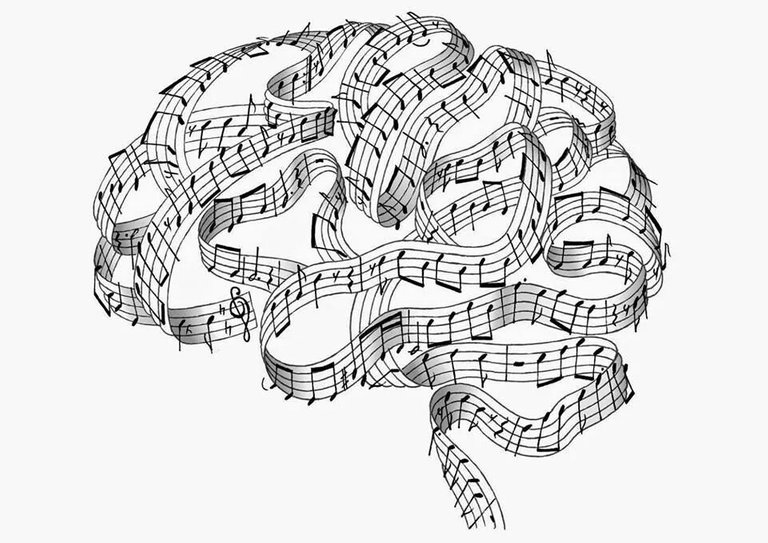Our brain has thousands of receptors that respond to different aspects of music such as tone, rhythm, and lyrics. The sound waves are transported through the air and upon entering the ear are then converted into electrical impulses which are transmitted to the brain through the auditory nerves. It is at this moment that the brain comes to interpret these electrical impulses as sounds where the tonality, rhythm and lyrics are interpreted in different areas of the brain.
Music is the ordered combination of rhythm, melody and harmony that is pleasing to the ears. The music you listen to can be related to your mood when you are happy you usually play music with a moving and catchy rhythm while if you are sad you choose something more melancholic, if you are in love you may listen to romantic music.
Music awakens memories that can become pleasant or not so pleasant memories, there are songs that we listen to that remind us of special moments we spent together with the family which generate emotions that are intensified when singing.
Listening to music can change our mood as it facilitates the transition from one emotion to another with some speed can reduce stress, listening to music reduces the level of cortisol in the brain, the hormone responsible for stress.
In my case I like to do household activities listening to music I feel that when I sing I have more mood and energy that allows me to perform activities more quickly.
Although I know that not all music can be pleasant to the ear, it is a matter of taste. What may be pleasant for me may be boring for someone else.
When listening to music it is advisable to lower the volume of the music because high volume can cause hearing loss, however, there are areas where you are surrounded by neighbors who listen to music at such a high sound that they are participants in the noise pollution that affects everyone who is nearby and it is impossible not to hear.
According to the website (https://www.muyinteresante.es/) we are given a quote where we review how music can transform our lives.
A new stimulus for neurology
Is music really so important for our lives? The latest findings in neurology, psychology and biology seem to show that it is: listening to pleasant melodies not only modifies our mood but can have a very positive influence on human cognitive development, on stimulating our intelligence and even on our health. Until very recently, these questions had not deserved the attention of science, but now, the study of the relationship between music and well-being has become a fertile source of research and, thanks to them, we are beginning to find answers to some secular questions. Is there a physiological mechanism that controls the cascade of emotions suggested by music? Is our ability to appreciate and create melodies related to the functioning of our organism? Is the love for notes inherited? One of the most defended theories in this regard reports that human nature dictates the conditions that a sequence of notes must have in order for us to interpret it as a piece of music.
Reflection: Music is wonderful and very well organized in a harmonic way can be very pleasant to the ear.
Version en español / Spanish version
La música... Melodía agradable al oído.
Nuestro cerebro tiene miles de receptores que responden a diferentes aspectos de la música, como el tono, el ritmo y la letra. Las ondas sonoras son transportadas por el aire y al entrar en el oído se convierten en impulsos eléctricos que se transmiten al cerebro a través de los nervios auditivos. Es en este momento cuando el cerebro llega a interpretar estos impulsos eléctricos como sonidos en los que la tonalidad, el ritmo y la letra se interpretan en diferentes áreas del cerebro.
La música es la combinación ordenada de ritmo, melodía y armonía que resulta agradable a los oídos. La música que escuchas puede estar relacionada con tu estado de ánimo, cuando estás feliz sueles poner música con un ritmo movido y pegadizo mientras que si estás triste eliges algo más melancólico, si estás enamorado puedes escuchar música romántica.
La música despierta recuerdos que pueden convertirse en memorias agradables o no tan agradables, hay canciones que escuchamos que nos recuerdan momentos especiales que pasamos junto a la familia que generan emociones que se intensifican al cantar.
Escuchar música puede cambiar nuestro estado de ánimo ya que facilita la transición de una emoción a otra con cierta rapidez puede reducir el estrés, escuchar música reduce el nivel de cortisol en el cerebro, la hormona responsable del estrés.
En mi caso me gusta hacer las actividades del hogar escuchando música siento que cuando canto tengo más ánimo y energía que me permite realizar las actividades con mayor rapidez.
Aunque sé que no toda la música puede ser agradable al oído, es cuestión de gustos. Lo que puede ser agradable para mí puede ser aburrido para otra persona.
Cuando se escucha música es aconsejable bajar el volumen de la misma porque un volumen alto puede provocar pérdida de audición, sin embargo, hay zonas en las que se está rodeado de vecinos que escuchan música a un volumen tan alto que son partícipes de la contaminación acústica que afecta a todos los que están cerca y es imposible no escuchar.
En la página web (https://www.muyinteresante.es/) se nos ofrece una cita en la que se repasa cómo la música puede transformar nuestras vidas.
Un nuevo estímulo para la neurología
¿Es realmente la música tan importante para nuestras vidas? Los últimos descubrimientos en neurología, psicología y biología parecen demostrar que sí: escuchar melodías agradables no sólo modifica nuestro estado de ánimo, sino que puede influir muy positivamente en el desarrollo cognitivo humano, en la estimulación de nuestra inteligencia e incluso en nuestra salud. Hasta hace muy poco, estas cuestiones no habían merecido la atención de la ciencia, pero ahora, el estudio de la relación entre la música y el bienestar se ha convertido en una fértil fuente de investigación y, gracias a ellas, empezamos a encontrar respuestas a algunas preguntas seculares. ¿Existe un mecanismo fisiológico que controle la cascada de emociones que sugiere la música? ¿Está relacionada nuestra capacidad de apreciar y crear melodías con el funcionamiento de nuestro organismo? ¿Se hereda el amor por las notas? Una de las teorías más defendidas al respecto informa de que la naturaleza humana dicta las condiciones que debe tener una secuencia de notas para que la interpretemos como una pieza musical.
Reflexión: La música es maravillosa y muy bien organizada de forma armónica puede ser muy agradable al oído.



Congratulations @maribeln! You have completed the following achievement on the Hive blockchain and have been rewarded with new badge(s) :
Your next target is to reach 300 upvotes.
You can view your badges on your board and compare yourself to others in the Ranking
If you no longer want to receive notifications, reply to this comment with the word
STOPCheck out the last post from @hivebuzz:
Support the HiveBuzz project. Vote for our proposal!